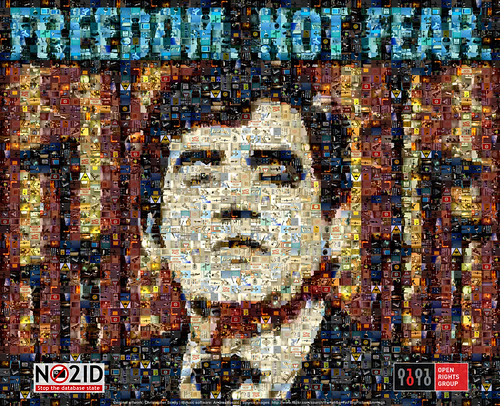One of the anti-Phorm gang has set up a concise web page outlining the objections many have to the BT-Phorm data snooping system. What's particularly useful is that every assertion has a citation supporting it. Read it and weep over what has become of British Telecom. [update: apologies, I botched the link, now corrected]

Yesterday I succumbed to temptation and bought a 32Gb iPod Touch to replace my venerable 2Gb iPod Nano. I realised before this purchase that my limited Windows resource would be a challenge: my library of music files is held on a fileserver running Ubuntu 8.10, and my sole XP machine is a small partition on an IBM laptop (I had decided I'd rather not fanny around jailbreaking the iPod, unless absoutely necessary). Still, there was enough disk space to get iTunes installed and to sync some music to the iPod.
The iPod is everything I'd expected, a terrific UI, effective touch screen, easy to set up wireless comms. But oh dear, it does show the fingerprints!
A scary reminder of the 1958 movie The Fly, here's writer-illustrator Zina Saunders' (no relation) picture of the ghastly Palin. Check out her website for a some acute political art, and click on this thumbnail for the bigger image.
I think that's me in the lab coat.
Wolbachia pipientis is a rather peculiar bacterium. It's an intracellular organism, and is found in a wide variety of tax, including nematodes, crustacea, and arachnids. About 20% of insect species are thought to have Wolbachia. Wolbachia has evolved a number of mechanisms to ensure transmission, which is generally maternal. There are a number of consequences of infection with these intracellular bacteria observed in different species - including reproductive isolation between infected and uninfected strains of the mosquito Culex pipiens. I also recall seeing a old paper (though I've long-since lost the citation) which claimes a growth advantage of infected Drosophila larvae in crowded culture, though I think this must have predated the identification of Wolbachia.
So some laboratory Drosophila strains are infected with Wolbachia, while some are not. This can lead to artefacts in many experiments. For example, in my own lab, we had some perplexing results concerning the effects of particular transgene on viability of some combinations - the involvement of Wolbachia became clear firstly when we noticed the effects depended on which which strain was paternal and which maternal in the cross, and finally the observation that this effect vanished after treating the transgenic stocks with antibiotic. These kind of artefacts are particularly important to consider when working with complex characteristics such as lifespan (as we do in my lab).
The Register reports latest developments in the Australian Government's ambitions to censor all internet traffic. Originating as some misguided initiative to "protect the children" (whatever happened to parental responsibility?), it now appears that Australian internet users are likely to face a situation where they must choose from one of two censored streams. Opting out of the "child-friendly" stream (which blocks a wide range of supposedly harmful content), merely subjects the user to an adult filter that blocks material deemed by the government to be inappropriate for adults.
Is this patronising and paternalistic system the future of the internet? Or has it the potential to lead to unreasonable censorship?
The Register reports that the anti ID card campaigners No2ID have succeeded in their long standing aim to obtain samples of Home Secretary Jacqui Smith's fingerprints.
Hot on the heels of announcing plans for draconian new communications monitoring Smith is taking forward the batty ID card agenda (first victims: overseas people, second victims: airport workers). Now it seems a glass bearing her dabs has been "borrowed" and those precious prints preserved, presumably for some nefarious purpose.
Back on 11th October, the Open Rights Group (together with a number of other concerned organisations) held a protest in Parliament Square to publicise the growing surveillance we are all subjected to. A large mosaic constructed from images of CCTV installations was assembled. The image (below) has been released under a Creative Commons licence. A bigger version is available.
From the ORG "The Big Picture" wiki:
Back at the end of 2007, Privacy International published this map of world surveillance societies. The full report is here. Each country is rated on a number of categories, and the results pooled to give an overall rating. The dear old United Kingdom doesn't come out of the analysis too well.
As I posted the other day, the latest version of Ubuntu GNU/Linux has been released. Ubuntu's schedule sees a new release every six months, and this is reflected in the release numbering: 7.10 was released in October 2007, 8.04 in April 2008 and 8.10 in October 2008. Each release has a nickname - 8.10 is also known as 'Intrepid Ibex', hence the image of an ibex to the left.
I usually avoid fresh installs of Ubuntu, preferring to go the route of upgrading via synaptic. This involves considerable file downloading, which can be a fairly lengthy affair, particularly soon after release date when the Ubuntu servers and their mirrors are presumably havily loaded. I have four computers running Ubuntu, and in light of the usual comments and complaints in the Ubuntu forums, I thought I'd note my upgrade experiences here.
The BBC are reporting that an initiative to curb drug use in Aberdeen will test pub-goers for drug use. It's a relatively non-invasive test involving hand swabs. Te odd thing about this is the way the test is being carried out.
People are tested when entering pubs and clubs: the test is apparently not compulsory, but those declining to be tested will be refused entry. An unusual definition of "not compulsory", that! So, let me get this right. I could be lawfully going about my business, and wish to visit a pub for a beer. I can be stopped for drug testing, and on declining to be tested will be refused entry.








